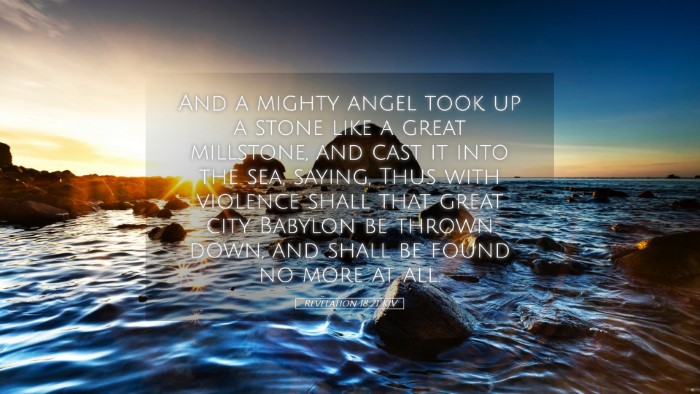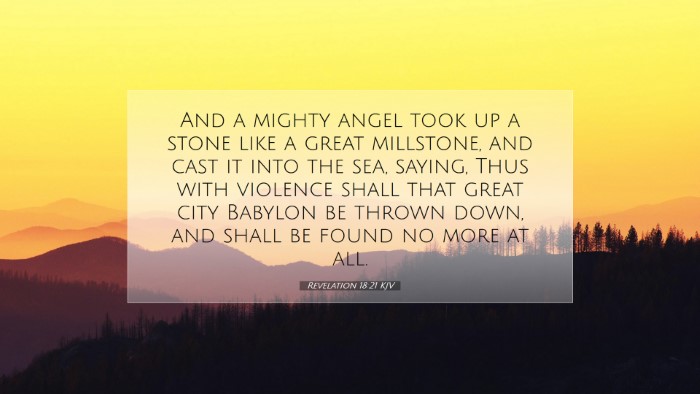Commentary on Revelation 18:21
Revelation 18:21 states: "And a mighty angel took up a stone like a great millstone, and cast it into the sea, saying, Thus with violence shall that great city Babylon be thrown down, and shall be found no more at all." This verse encapsulates one of the pivotal judgments against Babylon, symbolizing the ultimate downfall of a system characterized by moral and spiritual corruption.
Contextual Analysis
The Book of Revelation vividly portrays the conflict between God's kingdom and the forces of evil. By the time we arrive at chapter 18, the narrative has built to the climactic pronouncement of judgment against Babylon, often interpreted as a representation of both a literal city and a broader symbol for all that opposes God's reign.
The Symbolism of the Millstone
Matthew Henry notes that the image of the millstone conveys the weight and permanence of this judgment. A millstone was a significant and heavy object, used for grinding grain, and casting it into the sea signifies that Babylon’s destruction would be thorough and irrevocable. The act of throwing a millstone into the sea symbolizes not only destruction but also a release from sin's influence. This imagery invites consideration of the finality of divine judgment and the seriousness with which God regards the corruption of worldly systems.
Angelic Declaration
Albert Barnes emphasizes that the angel's proclamation underscores the inevitability of this destruction. The phrase "Thus with violence" indicates a sudden and forceful obliteration of Babylon. The angel’s declaration is not merely a statement but a prophetic assurance that God’s justice will prevail and that the great city will be no more. The contrast drawn here is powerful: the grandeur and might of earthly power will ultimately yield to divine authority.
Theological Implications
Adam Clarke offers insights into the theological implications of this verse, noting that Babylon represents the epitome of human pride and rebellion against God. The verse reflects the prophetic nature of Revelation, highlighting God’s sovereign right to judge evil. For theologians, the destruction of Babylon illustrates the consequences faced by those who perpetuate injustice and stand against divine commands.
Lessons for Believers
- The Reality of Judgment: This passage serves as a reminder of the certainty of divine judgment. It challenges believers to maintain faithfulness in the face of worldly temptations and moral decay.
- Hope in Restoration: While the destruction of Babylon is a tragic narrative, it also points to hope for God’s people. The dismantling of oppressive systems ultimately leads to the restoration and establishment of God's kingdom.
- Call to Vigilance: The vivid imagery encourages believers to remain vigilant against the allure of Babylonian systems characterized by greed, corruption, and immorality.
Conclusion
Revelation 18:21 serves as a sobering reminder of the outcome for those who oppose God's will and righteousness. The weighty symbol of the millstone cast into the sea provides a clear picture of the finality of God's judgment against such forces. For pastors, students, and theologians alike, this verse invites further reflection on the consequences of turning away from God and the hope for a new era where righteousness prevails. Overall, the destruction of Babylon is not just a historical account but a profound lesson for every generation about the nature of sin, judgment, and ultimately, redemption.


